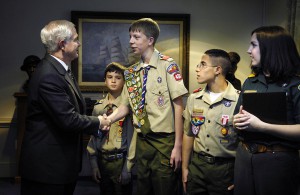Ending Nontheist Discrimination in the Boy Scouts
 Former BSA president Robert Gates shaking hands with an Eagle Scout. (Photo by Cherie A. Thurlby)
Former BSA president Robert Gates shaking hands with an Eagle Scout. (Photo by Cherie A. Thurlby) On May 26, Robert Gates completed his term as president of the Boy Scouts of America (BSA). The former US Secretary of Defense, who helped end the “don’t ask, don’t tell” policy that barred openly gay individuals from serving in the military, also strongly influenced the July 2015 BSA vote that ended the ban on openly gay boy scout leaders.
Although a step in the right direction for the traditionalist BSA nationals, the change to the national bylaws allows individual troops the right to decide whether or not they’d allow gay leaders into their ranks. By leaving the decision up to the local troops, the troops still maintain the right to discriminate on matters of one’s sexual orientation.
For this reason, groups like Scouts for Equality still petition for the amendment of the BSA’s national charter and bylaws so that troops are not allowed to exclude otherwise qualified candidates from joining due to their sexual orientation.
It seems that Gates’s decision to push for the masked end of the ban was simply a business-oriented effort to end the dramatic decline in Boy Scout membership. In his closing remarks as BSA president, Gates revealed his motivations behind his push to end the partial gay leadership ban: “Most importantly, through these challenges we have maintained our unity as a movement,” Gates said. “Significantly, membership in recent months has begun to move in a positive direction for the first time in many years.” It is clear that from his remarks that his priority was to reverse the trend of declining membership, not to ensure that all are given a fair opportunity to join the BSA.
The narrowmindedness of these motives ebb the progress that should otherwise naturally lead toward the inclusion of nontheists, who are still explicitly barred from joining the Scouts. There are glimmers of hope that change is coming, as the March 2016 admission of the Unitarian Universalist Association into the BSA suggests. As John Hooper, president of the Unitarian Universalist Humanist Association, points out in his reaction to the news, there is hope of working for change from within—that the more secular, humanistic UUs may vote in favor of the admission of atheists, agnostics, humanists, and other secular people.
Ultimately it’s likely that’s how change will occur. It’s certainly frustrating, especially to those like myself who would like to see the immediate removal of the secular ban and of religious indoctrination of children through scouting activities and curriculum. I was among the indoctrinated youth required to attend chapel on camping trips and recite the Boy Scout Oath: “On my honor, I will do my best. To do my duty to God and my country and to obey the Scout Law; To help other people at all times; To keep myself physically strong, mentally awake and morally straight.” Thinking back on those experiences, I shudder realizing that the stealthy mixture of fun activities distracted me from questioning the authority figures who subtly inculcated me with their religious beliefs.
It makes me even more upset that it will be an enormously uphill battle to break the cycle of the BSA’s religious indoctrination of youth. At this turning point, with Gates finishing his term as BSA president, the future remains unclear. But with AT&T CEO Randall L. Stephenson taking over as the new BSA president, there may be some hope for nontheist inclusion. He comes from a company that does not discriminate on the basis of religion and was also an advocate on the BSA Executive Board for ending the ban on gay Scout Leaders.
Idly standing by and hoping for change is obviously not conducive to solving the issues at hand. If you are interested in helping to end discrimination in the BSA, please consider contacting Scouts for Equality or joining your secular group in support of the Openly Secular campaign’s boycott of BSA.
